Climate change youth movement: Meet the future leaders of the debate
They’re young and still in the classroom, but that won’t stop our climate change heroes of tomorrow from fighting to improve our communities today. See our future leaders here.
Environment
Don't miss out on the headlines from Environment. Followed categories will be added to My News.
They are the up-and-coming climate change leaders, working to reduce emissions in their homes, classrooms and around the country.
News Corp’s Mission Zero works to celebrate fascinating and inspirational stories of ordinary Australians — and some extraordinary ones too — who have devoted themselves to tackling some of the toughest and trickiest issues in the journey to net zero.
‘THIS PROBLEM IS ONE FOR US YOUNG PEOPLE TO SOLVE’
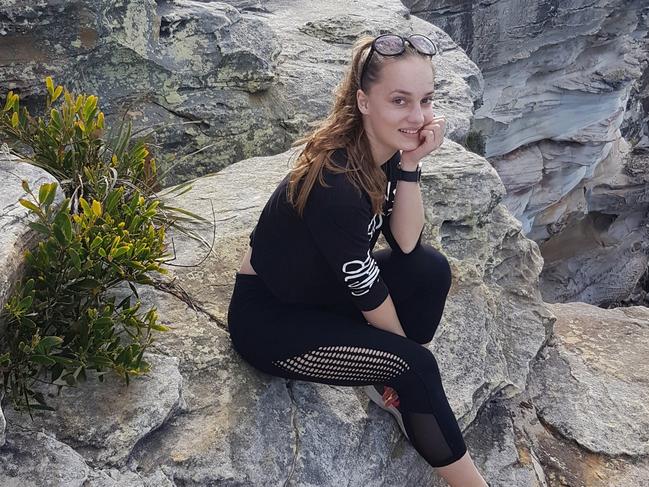
Stephanie Evans has an impressive resume already.
At the age of 10 she founded a charity called Seas for Change, advocating for the environment and threatened marine life.
Fast forward eight years and she’s now a global speaker on climate change and a mentor for young people.
Her friends have also been inspired to join the charity to help raise funds and awareness too.
Last month, Stephanie, a pupil at Manly Selective High School, was named Northern Beaches Young Citizen of the Year for her amazing efforts in the climate change space.
“I work with people across the world and I speak at events and schools locally to raise awareness of our threatened marine life and the environment,” she said.
“Unfortunately, this problem is one of us young people to solve.
“This is not a burden we asked for, but we have to do something.”
Stephanie, who hopes to do well enough in her HSC to do a double degree in law and arts, has also spoken out about the effects of climate change on the mental health of youth. She gave a speech at the 2019 NSW Parliament House (Children’s Parliament).
She is a also mentor for international organisations the Ervis Foundation and Ocean Heroes Bootcamp and a member of the Northern Beaches Council Youth Advisory Group.
Her Aboriginal heritage inspired her to make recommendations to NSW Education on how to improve schooling experiences for indigenous students.
STUDENT’S GROUNDBREAKING MISSION ON THE GLOBAL STAGE
University of Wollongong students and members of the Youth Climate Change project took to the world stage — representing Australia — when they developed a first-of-its-kind Climate Change Mission Statement for the United Nations.
Two members of the team, Commerce student Grace Mahon and Benjamin Hamill worked as part of the wider project to establish the university to achieve “Climate change Hero Status” from the United Nations Conference of Youth.
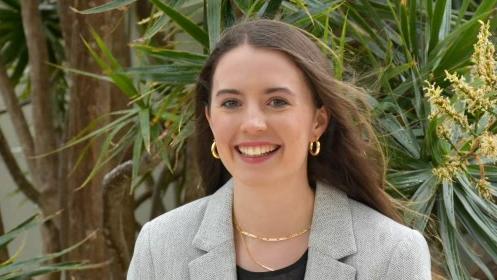
With the support of more than 2500 people in the community, the project team developed a five-point plan to make the University of Wollongong carbon neutral by 2030.
“We did a lot of consultation to work out how to reduce our emissions, identify bushfire risk, and strategic planning to identify renewable energy opportunities,” Ms Mahon said.
“Much like Wollongong Council, the university will increase the use of renewable energy by engaging in a renewable power purchasing agreement by 2025.
“This will see a partnership with suppliers and the university, with mandates for solar power, storage and control of renewable energy, and reducing energy use in off-peak periods.”
The Youth Climate Change Team also cemented a commitment from the university to transition its vehicle fleet to electric and hybrid by 2030, while increasing electric vehicle charging stations on campus.
“UOW was the only Australian institution to formulate a statement for the United Nations,” Ms Mahon said. “We have a plan to educate the community on climate action through a Climate Hero micro course, which is an online training module to learn more about climate change and action.”
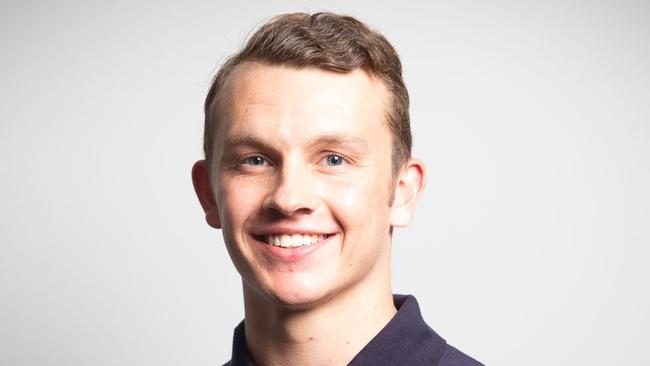
Psychology student Ben Hamill, 20, said getting the University of Wollongong to agree to carbon neutrality by 2030 was a major success for the UN Youth Climate Change project.
“This is a real change in pace for me, being a psychology student, but climate change is the most significant we will face in our lifetime,” he said.
“There have been major hurdles in this field because of deniers and campaigns against the reality that is climate change — but the onus is on us as individuals and a society to preserve the environment for future generations.”
Mr Hamill said it wasn’t just the university that issued its support, but the wider community.
“We have established a sustainable futures committee to ensure we are national and global leaders in this space,” he said.
“We made strong demands for not only individual change and commitments, but national ones as well about Australia being proactive around emissions targets.”
‘WE RECYCLE TO COOL OUR CLASSROOMS’
Dapto High School captain, Molly Chapman, is always looking for ways she can reduce her school’s carbon footprint.
The 16-year-old environmentalist is an integral member of Dapto High’s Green Group, which actively campaigns for recycling initiatives and green energy use at the school.
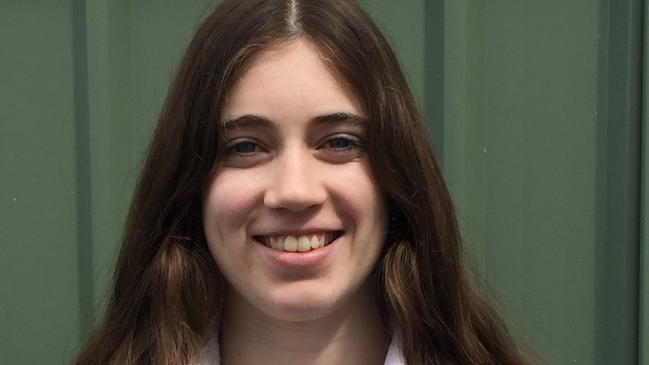
“One of the major projects we have worked on is a recycling collection drive,” Molly said.
“We have a team of volunteers that go around and collect bottles and cans that we collect funds from through recycling initiatives.
“All the money raised goes back to cooling our classrooms by purchasing solar-powered airconditioning.”
Molly said this was a way for the school to not only cool classrooms during the summer months, but encourage students to recycle “because they can see the benefits”.
“I am always looking for new environmental initiatives in the community and school and once I get back to face-to-face learning, this will be one of my goals as part of the leadership team.”
DEVELOPING TECH TO SAVE THE PLANET
Some of the brightest young minds when it comes to fighting climate issues can all be found in one Sydney school.
Year 9 students at St Clare’s Waverley College have come up with groundbreaking ideas to combat waste ending up in landfill and our waterways.
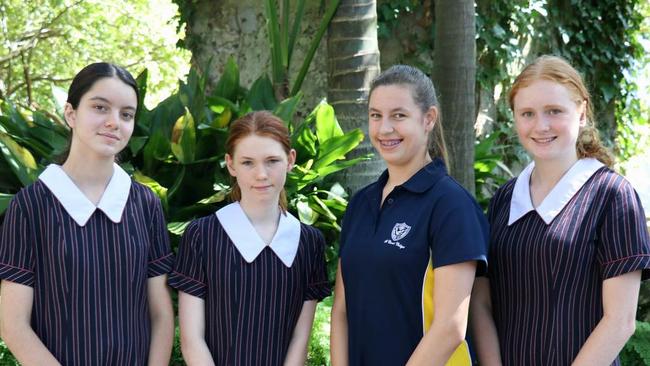
Ezgi Ozer, Bella Angel Otto de Grancy, Bridget Fitzgerald and Zara Dean created Capturefy — a 3D printed trap used to prevent plastics from entering Sydney’s waterways by sitting under the grill of a stormwater drain.
Speaking on behalf of her STEM-loving team, Bridget FitzGerald, said the creation was sparked after seeing drains clogged with waste in Waverley.
“Capturefy is designed to be a basket that sits in drains and catches anything non-biodegradable,” Bridget said. “We were working on a project last year to create a piece of technology to help the environment.
“We had multiple ideas on ways that it could work, which took a few months to perfect.”
The four students hope to encourage Waverley Council to invest in the project, before sending it “Sydney-wide”.
“Protecting our waterways are so important, so if we can encourage councils across the state to join our fight, we have big plans on the horizon,” Bridget said.
Meanwhile, fellow Year 9 students Suki Waddel and Olivia Zammit have been dubbed Australia’s teen-tech superheroes after creating an app designed to reduce “fast fashion” from ending up in landfill.
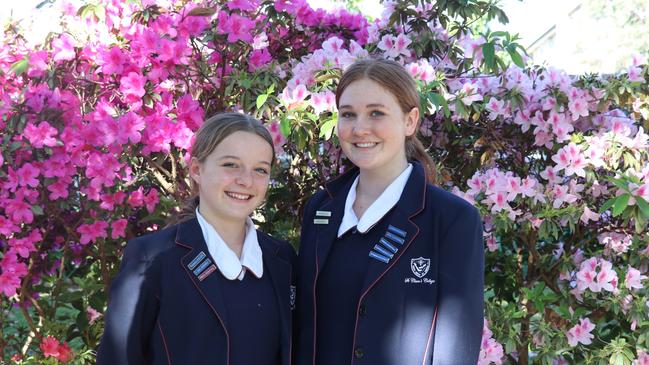
Thriftr works to connect sustainably sourced fashion lovers, like Suki and Olivia, with their nearest recycled clothing stores. The app will then give the store a rating and provide you information about the selection shop and why it is recommended.
The tech-teen prodigies have been names the 2021 Techgirls’ state and national competition winners.
“Olivia and I were working on a project aimed at tackling climate change an we were passionate about sustainable clothing — we decided to set our sights on the Fast Fashion industry,” Suki said.
“We were looking on Google Maps and noticed we couldn’t find thrift shops or second hand stores close to home, and we wanted to provide people with an opportunity to connect with their local second-hand shop.
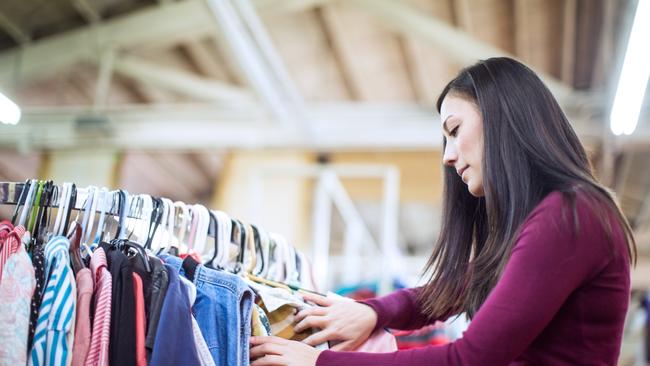
“Thriftr provides users with an environmental impact feature, which tells people how much carbon emissions they are saving by thrifting.”
The environmentally conscious teens said many of their friends had “no idea” what thrift shopping was, “but when the idea was launched, we had so much support”.
Although the project can’t be found in the App Store just yet, the Year 9 students are determined to get it off the ground before the leave school.
‘IDENTIFYING WAYS TO CUT WASTE, ENERGY USE IN THE CLASSROOM’
Jake Mahemoff is determined to cut down on the use of paper in the classroom, while researching other ways he can reduce the community’s carbon footprint.
The Year 11 student at International Grammar School, Ultimo is also resources leader in the school’s sustainable futures group.
The group, which meets regularly for roundtable talks to discuss and workshops to monitor waste, energy use, measure greenhouse gas emissions, and revamped waste management system.
“We installed energy efficient appliances such as motion sensors which turn off lights automatically,” he said. “We also recycle all waste where possible and printer cartridges, and provide our teachers with reusable whiteboard markers where possible.
“This has reduced our need to consume goods unnecessarily.”
The 17-year-old has called for the school to further incorporate “Triple Bottom Line sustainability principles into its policies and procedures”.
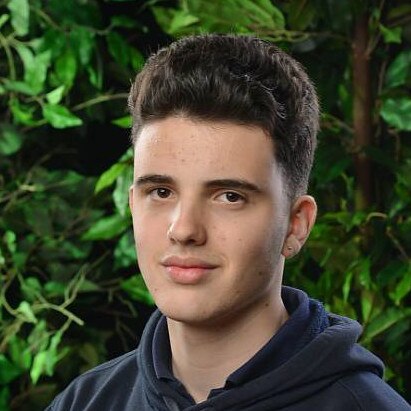
He said students at International Grammar School regularly discuss their ideas as part of the school’s plan for “empowered students, limitless learning and a sustainable future”.
“Many of the new renovations that have taken place at IGS have utilised recycled materials and sustainably sourced materials,” he said.
“At IGS, we have made structural changes to show our commitment in reducing our carbon footprint.
“The School introduced a Sustainability Framework, employed a Head of Sustainability, appointed a student Sustainability Leader and a student-led sustainability group.”
Jake said IGS has introduced a science extension program for students to “research solutions that address more of the sustainability problems that we observe around our school”.
“We ensure at IGS that we use the most efficient technology available to reduce our carbon footprint. We have solar panels on one of our buildings and an energy monitoring system to measure our carbon emissions, but we know we need to do more,” Jake said.
“We also take pride in our participation in national and global initiatives such as Earth Hour, Clean up Australia Day, Halfcut fundraising for rainforest conservation, Plastic Free July, Keep Australia Beautiful and Park it for the Planet.
“Last term we met with our local Federal MP, Tanya Plibersek, to discuss climate change policy, and we are committed to increasing our connections with political and environmental figures in order to better our school and evolve our sustainable policy.”
‘WE CAN’T VOTE, SO WE STRIKE FOR CHANGE’
17-year-old Natasha Abhayawickrama is a student leader at School Strike For Climate Australia.
The strike organiser, who has helped co-ordinate events of up to 70,000 students across the country, said without the opportunity to vote or elect leaders, students like her turned to striking in the streets to ensure their policy ideas are heard.
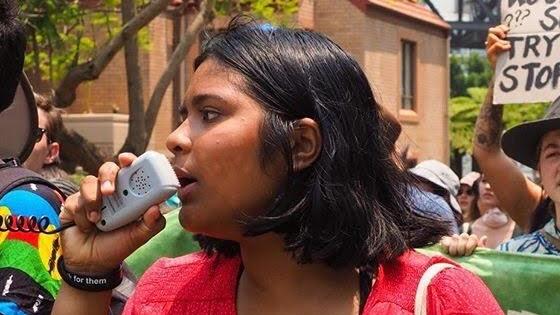
Natasha has been involved with the grassroots climate organisation since 2019 — sparked into action after raising concerns around the lack of planning for Net Zero targets.
“I was disappointed with how our leaders are responding to the climate crisis,” she said. “If our leaders in Canberra aren’t going to step up, then I knew need to do something.”
Natasha said the ongoing threat of Covid-19 didn’t stop thousands of students hosting more than 100 covid-safe event including online forums.
“We aren’t just there to yell and scream, we have policies we want considered,” she said.
“We want the Federal Government to accelerate the timeline for Net Zero to be met by 2035 at the latest, alongside 100 per cent renewable energy by 2030.
“The Federal Government can say they have a target for Net Zero by 2050, but they don’t have a plan in place, there is no tangible action and that needs to change.”
The 17-year-old student said suburbs across western Sydney,” and particularly communities of colour in those communities, are disproportionately impacted and affected by the climate crisis, however, they aren’t involved in the conversation”.
“We suffer from Urban Heat due to poor infrastructure, planning and lack of tree canopy — which are all issued that can be addressed at local, state and federal government levels.”
‘BREAKING THE STIGMA’ AROUND THE ENVIRONMENT
The threat of climate change, and reducing his own carbon footprint, is something that St Pius X College student James Baldock is reminded of every day.
The 18-year-old Year 12 student, from Pymble, said he and his peers at the Chatswood boys’ school were fighting to break the stigma that worrying about the environment “isn’t manly”.
“This year students gifted teachers trees to plant for International Teachers Day, rather than an unsustainable gift,” he said.
“We have also installed digital timers on our water fountains to show how many water bottles have been saved by reusing eco-friendly bottles.
“Students compete with different water fountains to see which groups can make the most difference.”
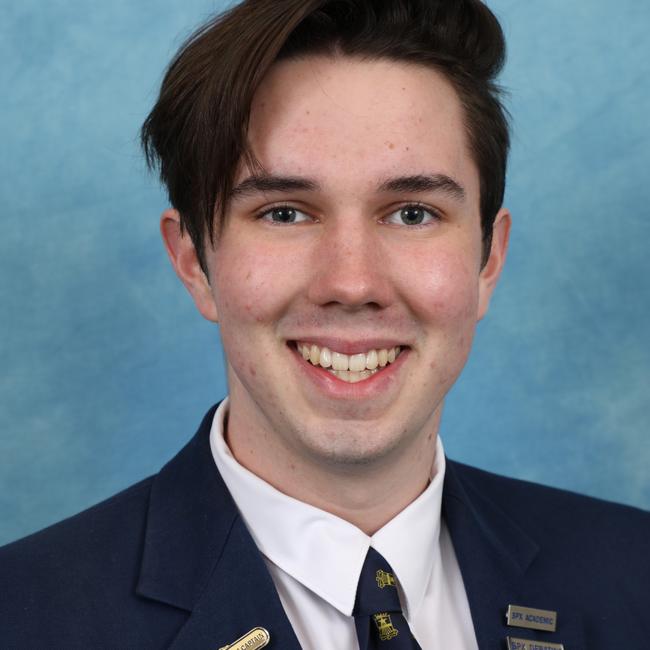
The HSC student said he regularly takes part in the WWF challenge to identify ways he can reduce his carbon footprint every day.
“Transport is a main issue for me, I try to take public transport or bikes to travel rather than driving or relying on uber,” he said. My friends and I aim to reduce our consumption of single-use plastics on a day-to-day basis and next year in university I want to join a climate committee.
Year 9 student and Student Empowerment Team member Michael Krizan said he and his peers have called on the school to become carbon neutral.
“Reducing our footprint is going to be so significant for our generation,” Michael said.
“We are facing the worst of the climate crisis in the coming years, so we need to act ourselves.”
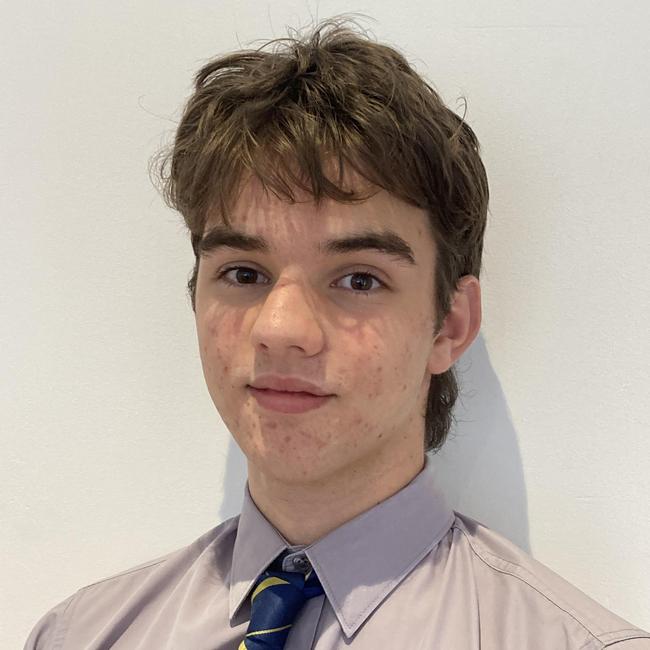
Michael said the school’s empowerment team pushed for the introduction of renewable energy modes and a requirement for new developments at the school to have a “green push” with solar panelling and green space.
“We are also working on the installation of LED lighting to reduce our emissions in every space in the school,” he said.
“This is a big topic, but we are working to simplify the issue so that everyone can act and make their own change — our generation need to fight for our own future.”
REWARDING KIDS FOR BEING ENVIRONMENTALLY FRIENDLY
Delphi Hinchcliffe is leading her school’s social justice and environment campaign.
The Year 12 student at St Catherine’s Waverley is determine to not only fight to reduce her school’s carbon footprint, but advocate for students to be aware of campaigns and projects they can support.
Delphi said students at St Catherine’s had developed a “real sense of urgency around combating our carbon emissions”, spearheading several campaigns at a local level.
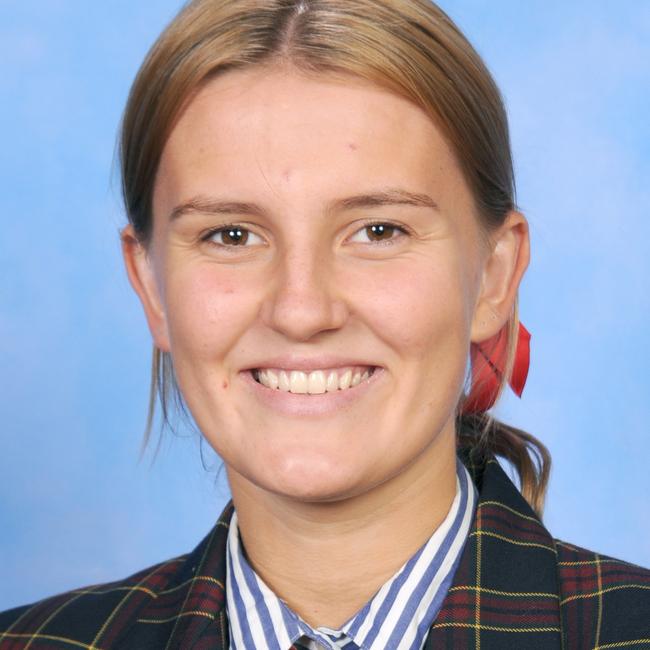
“We started an annual clothes swap and ‘nude food project’ which rewarded students that don’t use throwaway packaging for their recess and lunch,” Delphi said. “We are walking on a textbook swap to reduce the number in circulation, which will allow students to sell their textbooks at reduced prices to younger years.
“One of the main things I want to do is to ensure that our students are aware of political policies and who will do the most to turn our economy green.”
SMALL CHANGES FOR BIG RESULTS
School leaders Miranda Rhodes and Riley Henderson understand the future of the planet is in their hands as they take steps to slow the rate of climate change.
They are sustainability prefects at their Tweed Heads school, Lindisfarne Anglican Grammar.
They drive recycling projects such as use of sub-pods for compost and waste-free Wednesdays to encourage students to produce less waste and teach them to correctly dispose of the waste they do make.
“I simply want to do my part and look after planet Earth to ensure that my generation and generations to come have a healthier planet to grow up in,” Miranda, 17, said.

She said it was vital for Australia to reach net zero carbon dioxide emissions as it was the most effective way of tackling climate change.
“If climate change goes unchecked, the consequences will be catastrophic,” she said.
Meanwhile, Riley said she was driven by an overwhelming realisation of just how quickly the world was changing and not for the greater good.
“I wanted to make a contribution to the world, no matter how small or big of an impact, because at least I could tell myself I was trying,” Riley, 17, said.
She said achieving net zero emissions would be a good start to minimising the acceleration of climate change.
“It (net zero) would be hard to achieve and become a nationwide effort where everyone would have to put in, yet many things would have to change and may not happen within a foreseeable time,” Riley said.
RUNNING FOR COUNCIL
Ethan Hrnjak believes climate change is such a big issue he is running in the local council elections on December 4.
The 18-year-old is the lead candidate for The Greens in the Narrabeen Ward on Sydney’s northern beaches.
He will be campaigning for the election while he is studying and taking his HSC exams.
“I think young people are being silenced on the matter of climate change,” Ethan said.
He added that the problem was that most of the decision making is being made by older people.
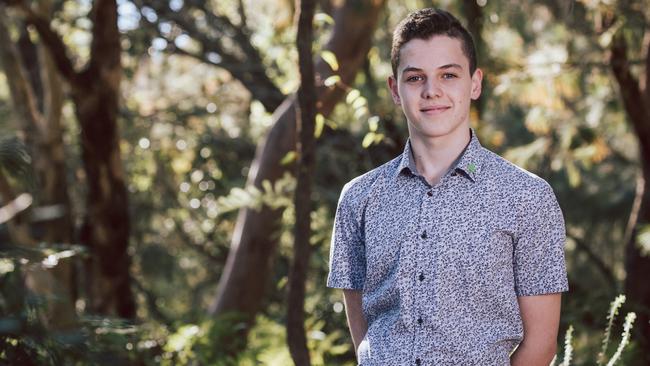
He said the vast majority of councillors in NSW are over 55 and that less than one per cent are aged between 18 and 25.
“People our age don’t have any power when it comes to politics or decision making,” he said.
“We need proper representation if we want to get something done on climate change.
“We need a young voice to advocate for young people.
“It’s important we get young people elected into positions where they can create that meaningful change.”
Ethan said the issue of climate change was going to be very relevant in his lifetime.
“If we don’t act now it’s going to be horrible for everyone,” he said.
GEN ZALI MOVEMENT
Temaeva Legaey-Hill is one of the core members of Gen Zali, a group set up to give young people a voice via independent Warringah MP Zali Steggall, who won her seat on the issue of climate change.
The 20-year-old uni student said climate change was an emotional issue for many young people.
“I’ve grown up in Warringah which has beautiful beaches, Manly Dam and forest walks,” she said. “Statistics show if we don’t take action we could lose some of that.
“That’s my home, it is the Earth I am going to inherit.
“I’m doing this for my little sister and my kids, if I choose to have them in the future.”
She said “Gen Z are fed up with politicians letting our environment decay and our planet heat up”.

“The politicians are supposed to be leading us.
“It feels like sometimes we have to educate them, that seems backwards.”
Tamaeva, who went to Loreto Kirribilli, said the group was concentrating on expanding their social media presence and educating their peers on how to make their voices heard.
One of their videos explains how to register for the next election.
She said Gen Zali will also be supporting Ms Steggall’s re-election campaign.
She said it wasn’t just young people in Warringah the group represented but also Gen Z across Australia.
“Gen Z and Gen Zali is fed up,” Temaeva said.
“We want to be influential in the climate change space - we want to fight back.”




